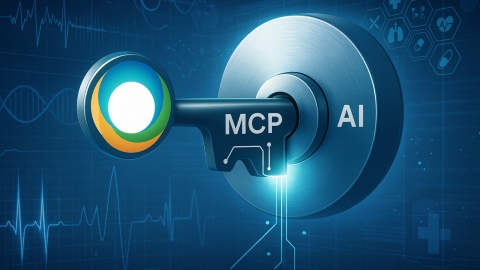Unlocking the Full Potential of Healthcare AI: What Is MCP and Why Does It Matter
August 26, 2025

AI is no longer a distant vision for hospitals — it’s arriving fast, in forms as diverse as clinical decision support, imaging analysis, automated triage, and intelligent assistants. But while model accuracy improves, another critical bottleneck remains: how do we connect AI with the real-world workflows and systems of a hospital?
That’s where MCP — Model Context Protocol — enters the picture.
What is MCP?
MCP (Model Context Protocol) is an emerging coordination protocol that enables AI agents to understand, reason about, and autonomously call external services and tools in a secure and structured way.
By standardizing how tools are described and how context is shared, MCP helps AI agents “know” which tools are available, and do so within controlled policy and permission boundaries.
MCP is likely to become a de facto standard for AI agent interoperability — and its relevance in healthcare is just beginning to show.
Why Do We Need MCP in Healthcare?
Today, most hospital AI projects are deployed as isolated tools — disconnected from EHRs, clinical systems, and real-time data. This leads to:
- Low adaptability: Models can't access up-to-date hospital information.
- Poor integration: Each new AI use case requires costly, custom-built connections.
- Limited impact: AI looks impressive but delivers little scalable value in practice
With Model Context Protocol (MCP) built into the integration platform, AI agents gain secure, instant access to all connected systems and data flows, turning every service into an AI-ready asset and enabling faster deployment, lower costs, and seamless adoption — all without rebuilding existing infrastructure.
Reimagining Healthcare Integration with MCP
An integration engine already connects hospital systems and exposes data through APIs. Add MCP, and you unlock something bigger:
- AI-readiness: APIs become semantically accessible to models.
- Faster development: No need to custom-code model interfaces.
- Scalable logic: AI can dynamically assemble workflows across systems.
- Centralised Security & Access Governance: AI Agent access is fully authenticated, authorised, and traceable within a unified security framework.
By embedding MCP, integration platforms move beyond connectivity — becoming engines that unleash your imagination and unlock your creativity in healthcare innovation.
What’s Next?
The real power of MCP lies not just in connecting AI to data — but in enabling two-way intelligence:
- AI Agent calling the integration platform to complete tasks
- The integration platform using AI to optimize itself
In future posts, we’ll share how Odin’s integration engine brings this to life — combining MCP with high-availability cluster architecture and real-world hospital deployment experience.
💡 MCP isn’t just a protocol. It’s a key to unlocking the next chapter of AI in healthcare.